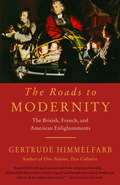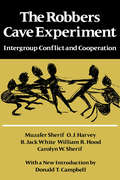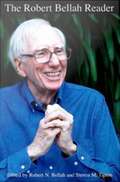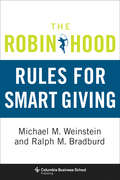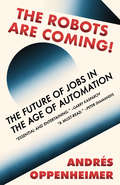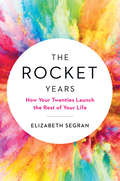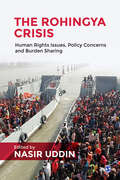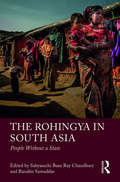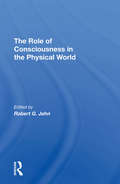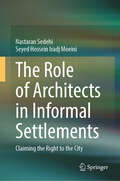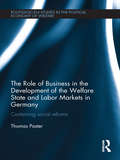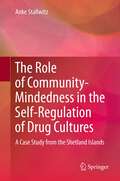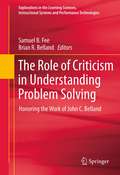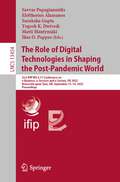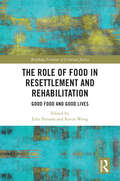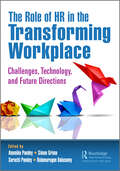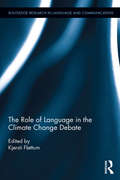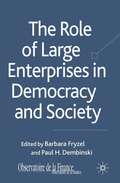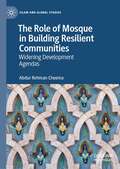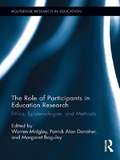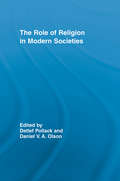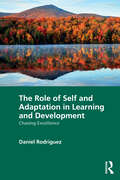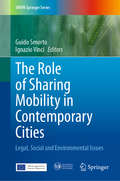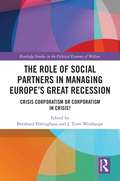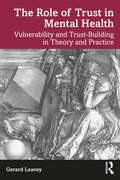- Table View
- List View
The Roads to Modernity
by Gertrude HimmelfarbIn an elegant, eminently readable work, one of our most distinguished intellectual historians gives us a brilliant revisionist history. The Roads to Modernity reclaims the Enlightenment-an extraordinary time bursting with new ideas about human nature, politics, society, and religion--from historians who have downgraded its importance and from scholars who have given preeminence to the Enlightenment in France over concurrent movements in England and America.Contrasting the Enlightenments in the three nations, Himmelfarb demonstrates the primacy and wisdom of the British, exemplified in such thinkers as Adam Smith, David Hume, and Edmund Burke, as well as the unique and enduring contributions of the American Founders. It is their Enlightenments, she argues, that created a social ethic-humane, compassionate, and realistic-that still resonates strongly today, in America perhaps even more than in Europe.The Roads to Modernity is a remarkable and illuminating contribution to the history of ideas.From the Trade Paperback edition.
The Robbers Cave Experiment: Intergroup Conflict and Cooperation. [Orig. pub. as Intergroup Conflict and Group Relations]
by Jack White Muzafer Sherif Carolyn W. Sherif William R. Hood O. J. HarveyOriginally issued in 1954 and updated in 1961 and 1987, this pioneering study of "small group" conflict and cooperation has long been out-of-print. It is now available, in cloth and paper, with a new introduction by Donald Campbell, and a new postscript by O.J. Harvey.In this famous experiment, one of the earliest in inter-group relationships, two dozen twelve-year-old boys in summer camp were formed into two groups, the Rattlers and the Eagles, and induced first to become militantly ethnocentric, then intensely cooperative. Friction and stereotyping were stimulated by a tug-of-war, by frustrations perceived to be caused by the "out" group, and by separation from the others. Harmony was stimulated by close contact between previously hostile groups and by the introduction of goals that neither group could meet alone. The experiment demonstrated that conflict and enmity between groups can be transformed into cooperation and vice versa and that circumstances, goals, and external manipulation can alter behavior.Some have seen the findings of the experiment as having implications for reduction of hostility among racial and ethnic groups and among nations, while recognizing the difficulty of control of larger groups.
The Robert Bellah Reader
by Robert N. Bellah Steven M. TiptonPerhaps best known for his coauthored bestselling books Habits of the Heart and The Good Society, Robert N. Bellah is a truly visionary leader in the social study of religion. For more than four decades, he has examined the role of religion in modern and premodern societies, attempting to discern how religious meaning is formed and how it shapes ethical and political practices. The Robert Bellah Reader brings together twenty-eight of Bellah's seminal essays. While the essays span a period of more than forty years, nearly half of them were written in the past decade, many in the past few years. The Reader is organized around four central concerns. It seeks to place modernity in theoretical and historical perspective, drawing from major figures in social science, historical and contemporary, from Aristotle and Rousseau through Durkheim and Weber to Habermas and Mary Douglas. It takes the United States to be in some respects the type-case of modernity and in others the most atypical of modern societies, analyzing its common faith in individual freedom and democratic self-government, and its persistent paradoxes of inequality, exclusion, and empire. The Reader is also concerned to test the axiomatic modern assumption that rational cognition and moral evaluation, fact and value, are absolutely divided, arguing instead that they overlap and interact much more than conventional wisdom in the university today usually admits. Finally, it criticizes modernity's affirmation that faith and knowledge stand even more utterly at odds, arguing instead that their overlap and interaction, obvious in every premodern society, animate the modern world as well. Through such critical and constructive inquiry this Reader probes many of our deepest social and cultural quandaries, quandaries that put modernity itself, with all its immense achievements, at mortal risk. Through the practical self-understanding such inquiry spurs, Bellah shows how we may share responsibility for the world we have made and seek to heal it.
The Robin Hood Rules for Smart Giving (Columbia Business School Publishing)
by Michael Weinstein Ralph BradburdThe Robin Hood Foundation is a charitable organization focused on alleviating poverty in New York City. Michael M. Weinstein is the foundation's senior vice president. In that role he developed its metrics-based approach, called "relentless monetization," to ensure that the money the foundation receives and grants is used most effectively. Ralph M. Bradburd has served as long-time consultant to Robin Hood on matters of metrics. In this book Weinstein and Bradburd show how to implement the Robin Hood approach and explain how any nonprofit organizations or philanthropic donor can use it to achieve the greatest benefit from every philanthropic dollar. Drawing on their extensive knowledge, the authors devote specific chapters to the difficulties most frequently encountered by donors trying to measure the benefits of their initiatives.. This book provides straightforward, targeted advice for funding "smart" nonprofit programs.
The Robots Are Coming!: The Future of Jobs in the Age of Automation
by Andres OppenheimerStaying true to his trademark journalistic approach, Andrés Oppenheimer takes his readers on yet another journey, this time across the globe, in a thought-provoking search to understand what the future holds for today's jobs in the foreseeable age of automation.The Robots Are Coming! centers around the issue of jobs and their future in the context of rapid automation and the growth of online products and services. As two of Oppenheimer's interviewees -- both experts in technology and economics from Oxford University -- indicate, forty-seven percent of existing jobs are at risk of becoming automated or rendered obsolete by other technological changes in the next twenty years. Oppenheimer examines current changes in several fields, including the food business, legal work, banking, and medicine, speaking with experts in the field, and citing articles and literature on automation in various areas of the workforce. He contrasts the perspectives of "techno-optimists" with those of "techno-negativists" and generally attempts to find a middle ground between an alarmist vision of the future, and one that is too uncritical. A self-described "cautious optimist", Oppenheimer believes that technology will not create massive unemployment, but rather will drastically change what work looks like.
The Rocket Years: How Your Twenties Launch the Rest of Your Life
by Elizabeth SegranThe Defining Decade for the #Adulting generation—a book that blends storytelling and data to unpack the choices you make in your twenties, why they matter, and how to turn those critical years into a launchpad for the life you want.We tend to think of our twenties as a playground for life: A time for low-consequence experimentation and delaying big decisions. But the truth is that while you’re muddling through those years—exploring new cities, dating the wrong people, hopping between jobs—a small shift in your flight path can mean the difference between landing on Mars or Saturn. As the data shows, the choices we make (or put off) during this critical decade about our career, marriage, health, friends, even downtime have the greatest impact on how our lives play out. For example, did you know that people who marry between the ages of 28 and 32 have the lowest risk of divorce? And that the average 25 year old has 20 close friends, but this will shrink to 8 after age 40? And that most of us don’t acquire new hobbies after we hit our thirties?Rather than prescribing one correct path (who are we kidding, there’s no such thing anyway!), Elizabeth Segran invites readers to think critically and holistically about the life they want to build. With signature warmth and humor, Segran is the guide we all wish we had to show us the way. Blending insightful anecdotes with research from economics, sociology, and political science, The Rocket Years is an empowering exploration of these exciting, confusing, wonderful years.
The Rohingya Crisis: Human Rights Issues, Policy Concerns and Burden Sharing
by Nasir UddinThe Rohingyas have become a ‘crisis’ for all including the host countries, the international community and even for themselves. Much has been written about the clearance operation perpetrated by Myanmar military forces and vigilantes in 2017, forcing Rohingya survivors to migrate and seek refuge in other countries. How they have been surviving during the post-2017 period has largely been left out in academic literature. The Rohingya Crisis: Human Rights Issues, Policy Concerns and Burden Sharing addresses the many aspects of Rohingya lives in Bangladesh, Myanmar, India, Southeast Asian countries and in the West. This book studies the transforming public discourse about Rohingyas, the blame-game of ecological costs of Rohingya presence, and the declining relationship between the host communities and the refugees. It examines causes for escalating intra-group conflicts, decreasing international support and the repatriation failures. It analyses the critical roles of the international community, global civil society and diaspora activism, and discusses what the future might hold. ‘Burden’ sharing should be seen as sharing responsibilities for global justice. It is not the Rohingyas who are the burden.
The Rohingya in South Asia: People Without a State
by Ranabir Samaddar Sabyasachi Basu Ray ChaudhuryThe Rohingya of Myanmar are one of the world’s most persecuted minority populations without citizenship. After the latest exodus from Myanmar in 2017, there are now more than half a million Rohingya in Bangladesh living in camps, often in conditions of abject poverty, malnutrition and without proper access to shelter or work permits. Some of them are now compelled to take to the seas in perilous journeys to the Southeast Asian countries in search of a better life. They are now asked to go back to Myanmar, but without any promise of citizenship or an end to discrimination. This book looks at the Rohingya in the South Asian region, primarily India and Bangladesh. It explores the broader picture of the historical and political dimensions of the Rohingya crisis, and examines subjects of statelessness, human rights and humanitarian protection of these victims of forced migration. Further, it chronicles the actual process of emergence of a stateless community – the transformation of a national group into a stateless existence without basic rights.
The Role Of Consciousness In The Physical World: The Role Of Consciousness In The Physical World
by R. G. JahnDo we live in a deterministic universe that passively awaits our observation and utilization? Or do we create our own reality in the process of observing it? These questions, writes the editor, traditionally have been the domain of philosophers, theologians, and romantic writers; in recent years, though, they have become a concern of scientists. Ad
The Role of Architects in Informal Settlements: Claiming the Right to the City
by Seyed Hossein Moeini Nastaran SedehiWith over one billion people worldwide living in informal settlements and enduring substandard housing conditions, these areas present one of the greatest urban challenges of our time. The existence of informal settlements is deeply intertwined with global issues such as climate change, war-induced displacement, and colonialism. As sustainability becomes a central focus in various disciplines, including architecture, the path to sustainable urban development lies in addressing the problems of informal settlements. Architecture's relevance to this discourse is paradoxically highlighted by its perceived 'irrelevance'. Informal settlements are often overlooked as legitimate sites for architectural practice. This neglect stems from two assumptions: first, architecture's traditional dependence on power and capital, isolating the marginalised who rarely have the chance to receive architectural services; and second, architecture's perceived incapability to address urban-scale infrastructural problems, and thereby its reduction to aesthetic creativity and form making. This book challenges architecture's focus on the 'centre' and its lack of ambition for creating a pervasive impact on cities. Instead, it highlights the profession's potential to serve the common good and address urban-scale infrastructural issues and proposes the effective engagement of architects in informal settlements. Drawing on Henri Lefebvre’s dichotomy of margin versus centre in urban spaces, informal settlements are interpreted as spaces on the city’s periphery, created by the marginalised with limited access to power, capital, and authority. By revisiting interrelated concepts such as the production of space, the right to the city, social architecture, and spatial agency within the context of informal settlements, the book claims a space for architectural practice in these areas. It incorporates discussions on insurgent citizenship and critiques of the self-help approach, contextualising its arguments with architectural intervention precedents from around the world. The book concludes with a brief manifesto on practising architecture in informal settlements. The book aspires to inspire architecture students, practitioners, and researchers to explore the profession’s potential in social problem-solving and to push the boundaries of practice towards inclusiveness for all urban inhabitants.
The Role of Business in the Development of the Welfare State and Labor Markets in Germany: Containing Social Reforms (Routledge Studies in the Political Economy of the Welfare State)
by Thomas PasterThis book assesses the role of employers in the development of welfare state and labour market institutions. Building on an in-depth analysis of Germany, a market economy known to often provide economic benefits to firms, this book explores one of the most contested issues in the comparative and historical literature on the welfare state. In a departure from existing employer-centered explanations, the author applies new empirical data to contend that the variation in acceptance of social reform depends more on changes in the types of political challenges faced by employers, than on changes in the type of institutions considered economically beneficial. Covering major reforms spanning more than a century of institutional development in unemployment insurance, accident insurance, pensions, collective bargaining, and codetermination, this book argues that employers support social policy as a means to contain political outcomes that would have been worse, including labour unrest and more radical reform plans. Using new and controversial findings on the role of employers in welfare state development, this book considers the conditions for a peaceful coexistence of a generous welfare state and the business world. The Role of Business in the Development of the Welfare State and Labor Markets in Germany will be of interest to students and scholars of welfare and social policy politics, political economy and European politics.
The Role of Community-Mindedness in the Self-Regulation of Drug Cultures
by Anke StallwitzThis book analyzes heroin users and the drug subculture on the Shetland Islands, an area known for its geographical remoteness, rural character and relative wealth. It fills the scientific gap created by the conventional research in heroin research, which is usually conducted in urban areas and relies on treatment and prison populations. Based on qualitative, in-depth interviews with twenty-four heroin users, this book depicts and analyzes the nature and historical development of the local heroin scene. It illustrates the features and internal structures of the subculture, and it examines the manner in which both are influenced by the location-specific geographical, cultural and socio-economic conditions. It thus reveals complex causal associations that are hard to recognize in urban environments. Complete with a list of references used and recommendations for future research, this book is a vital tool for progressive and pragmatic approaches to policy, intervention and research in the field of illicit drug use.
The Role of Criticism in Understanding Problem Solving
by Samuel Fee Brian BellandIn 1991, Denis Hlynka and John Belland released Paradigms Regained, a well received reader for graduate students in the field of educational technology. The Role of Criticism in Understanding Problem Solving updates some of those ideas initially proposed in Paradigms Regained, and extends the conversation into the contemporary discourse regarding problem based learning (PBL). Paradigms proposed the idea of criticism as a third method for the conduction of educational research, the first two being qualitative and qualitative. The concept of criticism as a tool for research is not well established in educational technology, although it is well established in other educational research traditions such as Curriculum Studies. Unfortunately, it is not always clear how criticism can be applied. This book views criticism as a way to step back and look at an educational intervention within educational technology through a particular critical lens. Criticism is viewed as a valuable approach to guiding meta analyses and theoretical studies, serving to prevent the proverbial "spinning of the wheels" that often happens in educational research. By indicating new potential research questions and directions, criticism approaches can invigorate educational research. This book revisits the ideals of criticism in order to establish their usefulness for studying educational technology interventions to support problem based learning. First, a few foundational chapters set the stage for the conversations on criticism. Then, the role criticism can play in enhancing analysis and interpretation of the PBL literature is explored. Finally, case studies addressing the central concepts of the text are presented and dissected. This book represents a complete overhaul and rethinking of the use of criticism as a method for understanding and furthering the research area of PBL within the field of Educational technology.
The Role of Digital Technologies in Shaping the Post-Pandemic World: 21st IFIP WG 6.11 Conference on e-Business, e-Services and e-Society, I3E 2022, Newcastle upon Tyne, UK, September 13–14, 2022, Proceedings (Lecture Notes in Computer Science #13454)
by Yogesh K. Dwivedi Matti Mäntymäki Ilias O. Pappas Suraksha Gupta Savvas Papagiannidis Eleftherios AlamanosThis book constitutes the refereed proceedings of the 21st IFIP WG 6.11 Conference on e-Business, e-Services, and e-Society, I3E 2022, which took place Newcastle-upon-Tyne, UK, in September 2022. The 37 papers presented in this volume were carefully reviewed and selected from 72 submissions. They were organized in topical sections as follows: Artificial intelligence; Data and Analytics; Careers and ICT; Digital Innovation and Transformation; Electronic Services; Health and Wellbeing; Pandemic; Privacy, Trust and Security.
The Role of Food in Resettlement and Rehabilitation: Good Food and Good Lives (Routledge Frontiers of Criminal Justice)
by Julie Parsons and Kevin WongExploring the role of food in enabling people with convictions to live a “good life”, this book examines the tangible ways in which growing food, cooking, and eating together has the potential to be both transformative and small steps incremental in facilitating desistance journeys for people with convictions.At its most reductive, food sustains us physically; it’s the fuel which keeps us alive. Of course, emotionally, culturally, and socially it does more than that. This edited book addresses an under-researched area of resettlement and rehabilitation which has real-world application to policy and practice in criminal justice and related areas such as mental health, physical health, employment, and education. Importantly, given the relatability of food growing, cooking, and eating to the wider public, it offers opportunities to connect the desistance journeys and lives of people with convictions to the wider public.The Role of Food in Resettlement and Rehabilitation will be of great interest to students and scholars of criminology, sociology, social work, and food studies. It is also important reading for government policymakers in criminal justice and health care, social policy, and criminal justice practitioners, including prison governors, social workers, and providers of services for people with convictions in custody and community.
The Role of HR in the Transforming Workplace: Challenges, Technology, and Future Directions
by Simon Grima Balamurugan Balusamy Anamika Pandey Suruchi PandeyChanging technology and the growing demand for workforce intelligence have ushered in a new era of human resource (HR) transformation and have compelled HR professionals to continually ideate, innovate, and adapt. This book covers the changing role of HR in the transformation of workplaces to be successful globally. With challenges come new opportunities for HR to completely transform. Currently, technology is considered to be an extension of human beings rather than an external component, which makes people less socially connected. Physical, psychological, and financial well-being in this machine-led world is driving the agenda of HR. Individuals with complex business requirements and long-term goals must coexist with the gig economy, flexible workplaces, and changing priorities. This book precisely addresses these issues. More innovations are needed to create solutions for an ever-growing digital world. This book, therefore, explains how the role of HR executives must be to understand how emerging technologies are affecting company culture, strategy, operational plans, and the hiring of future talent. Crafting a career path for knowledge workers with challenging roles with fulfilling job aspects remains a puzzle. Keeping people engaged and happier is one of the major challenges that HR professionals experience. Different generations in the workplace with differing styles of learning, communication, and dynamic expectations add to these challenges. HR functions must keep evolving to overcome these challenges to transform the workplace, and it is essential to recognize how HR can act as a strategic business advisor through the effective use of technology. This book provides practical advice in these areas. In addition, this book helps professionals, researchers, and practitioners understand the way advanced technology and automation are influencing HR practices and processes in the new normal. The topics are designed to capture the most advanced technology-based HR practices for workplace transformations in industry and academia. This book assembles contributions from experts in HR planning, human capital management, business analytics, people analytics, predictive analysis, and automation from across the world, contributing their knowledge to identify the different attributes of the above-mentioned field of study. The book’s chapters are designed and organized pragmatically to enhance the reader’s experience and interest, reflecting upon a few untouched segments in the HR domain such as HR data privacy, data security, diversity, and inclusion using explainable AI (XAI), blockchain, and metaverse.
The Role of Language in the Climate Change Debate (Routledge Research in Language and Communication)
by Kjersti FlottumThis volume takes a distinctive look at the climate change debate, already widely studied across a number of disciplines, by exploring the myriad linguistic and discursive perspectives and approaches at play in the climate change debate as represented in a variety of genres. The book focuses on key linguistic themes, including linguistic polyphony, lexical choices, metaphors, narration, and framing, and uses examples from diverse forms of media, including scientific documents, policy reports, op-eds, and blogs, to shed light on how information and knowledge on climate change can be represented, disseminated, and interpreted and in turn, how they can inform further discussion and debate. Featuring contributions from a global team of researchers and drawing on a broad array of linguistic approaches, this collection offers an extensive overview of the role of language in the climate change debate for graduate students, researchers, and scholars in applied linguistics, environmental communication, discourse analysis, political science, climatology, and media studies.
The Role of Large Enterprises in Democracy and Society
by Paul H. Dembinski Barbara FryzelUses both political and democratic studies perspectives as well as economic, philosophical and managerial to provide a practical insight into the issues like the extensive economic power of large enterprises and changing balance of power between public and private sector, regulation and the governance of large private entities.
The Role of Mosque in Building Resilient Communities: Widening Development Agendas (Islam and Global Studies)
by Abdur Rehman CheemaThis book is about the role of the mosque in the aftermath of the 2005 earthquake in Pakistan. Disasters give rise to a situation where people from different parts of the world, quite unfamiliar with each other, come into contact to save lives, provide necessities such as food and shelter, rebuild homes and enable community recovery. During these challenging times, community-based religious institutions such as churches, mosques and temples are a practical choice for reaching people living nearby to fulfil their needs. The book shows the contributions of the mosque as a physical, spiritual and social place for improving the knowledge and practice of disaster risk reduction and management including the COVID-19 pandemic. It also illuminates the widening role of religion in development. The book reinforces the case for broader engagement with all community-based religious institutions. The book is of interest to academics in diverse fields including development studies, disaster studies, sociology, anthropology, religion, Asian studies, emergency and disaster management. It will also of interest to the professional staff of disaster management authorities, public sector, bilateral and multilateral aid allocation and implementing agencies and those of humanitarian organizations.
The Role of Participants in Education Research: Ethics, Epistemologies, and Methods (Routledge Research in Education #87)
by Margaret Baguley Patrick Alan Danaher Warren MidgleyThis book explores different perspectives on the role, influence and importance of participants in education research. Drawing on a variety of philosophical, theoretical and methodological approaches, the book examines how researchers relate to and with their participants before, during, and after the collection and/or production of data; reimagining the rights of participants, the role/s of participants, the concept/s of "participant" itself.
The Role of Religion in Modern Societies (Routledge Advances in Sociology)
by Detlef Pollack Daniel V. A. OlsonDoes modernization lead to the decline of religion? This question lies at the centre of a key debate in the sociology of religion. During the past decade American scholars, using primarily American data, have dominated this debate and have made a strong case that the answer to this question is no. Recently, however, a new crop of European scholars, working with new sources of European data, have uncovered evidence that points toward an affirmitive answer. This volume pays special attention to these trends and developments to provide the reader with a more well-rounded understanding of the many ways in which religion interacts with modernization. Respected scholars such as David Voas, Steve Bruce and Anthony Gill examine modern societies across the world in this splendid book which will interest sociologists, political scientists, historians, and theologians in equal measure.
The Role of Self and Adaptation in Learning and Development: Chasing Excellence
by Daniel RodriguezThis book introduces readers to Psychoadaptation—a general model of change that stresses the importance of experiencing disequilibrium in the development of a healthy Self—and applies it to a range of examples across the academic, sport, and health domains. Built upon his studies of human development and learning, Daniel Rodriguez offers an overview of a model of change with a specific focus on the development of Self and conceptions of Self. The author begins by focusing on academic topics such as conducting research, teaching, and being a student, before highlighting examples from sport and health. With a clear and engaging tone, each chapter highlights how the theory behind Psychoadaptation can be applied across a variety of contexts and in the modern world. The result is a solid balance of scientific theory and practical application that readers can relate to their own circumstances and research. Offering a unique conceptualization to development, learning, and behavior change, this is a useful resource for students and scholars within these areas, as well as clinicians working in the fields of health and sport. It will also benefit individuals looking to embark upon their own journeys to Self-development.
The Role of Sharing Mobility in Contemporary Cities: Legal, Social and Environmental Issues (UNIPA Springer Series)
by Guido Smorto Ignazio VinciThe emergence of sharing mobility is having a profound impact on urban landscapes. In fact, it is deeply affecting the traditional organization of local services by calling into question how urban transportation is planned, and by redesigning city spaces. Further, by connecting people to shared assets, services or both, sharing mobility is poised to facilitate the more efficient use of underutilized resources, becoming a powerful tool for economic growth and social inclusion, while also contributing to sustainability. That being said, the economic, social and spatial impacts of sharing mobility have not been sufficiently investigated, and so far, the evidence is mixed. From a normative standpoint, while it is relevant to better understand the relations between sharing mobility, the city and the environment, it is also of crucial importance to define new policies and sound rules for sharing mobility in urban areas. Against this backdrop, this book adopts a multidisciplinary perspective to explore the role that sharing mobility can play in the creation of more just and sustainable cities.
The Role of Social Partners in Managing Europe’s Great Recession: Crisis Corporatism or Corporatism in Crisis? (Routledge Studies in the Political Economy of the Welfare State)
by J. Timo Weishaupt Bernhard EbbinghausThis comprehensive study of the Great Recession and its consequences provides comparative analyses of the extent to which social concertation between government, unions, and employers varied over time and across European countries. This edited volume – a collaboration of international country experts – includes eight in-depth country case studies and analysis of European-level social dialogue. Further comparisons explore whether social concertation followed economic necessity, was dependent on political factors, or rather resulted from labour’s power resources. The importance of social partners’ involvement is again evident during the Covid-19 pandemic. Examining contemporary crises, the book will be of considerable interest to scholars and students of public and social policies, comparative political economy, and industrial relations – and more broadly to those following European and EU politics.
The Role of Trust in Mental Health: Vulnerability and Trust-Building in Theory and Practice
by Gerard LeaveyThis book offers a comprehensive examination of trust and its relationship with mental illness and wellbeing.Engaging with a broad range of mental health research, theory, and practice through various transdisciplinary theoretical models of trust, this book highlights the social and family contexts surrounding the making and breaking of trust and mental health. It examines various sociological conceptual and theoretical frameworks of risk and trust while also engaging with evolutionary perspectives on the human need for cooperation and trust. The author describes how, in a world of constant connectivity, the drawing of boundaries assigns some people as strangers, using stigma as a form of power. The book concludes by considering the future of mental health and where trust-building may be possible. Each chapter is interspersed with observations and insights from the author’s personal research covering many populations, communities and issues over several decades.Drawing on a wide range of interdisciplinary literature, the book will be of interest to mental health practitioners, researchers, and scholars interested in the psychosocial aspects of mental illness and stigma.
